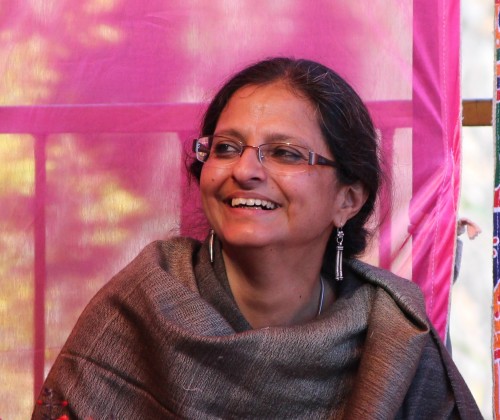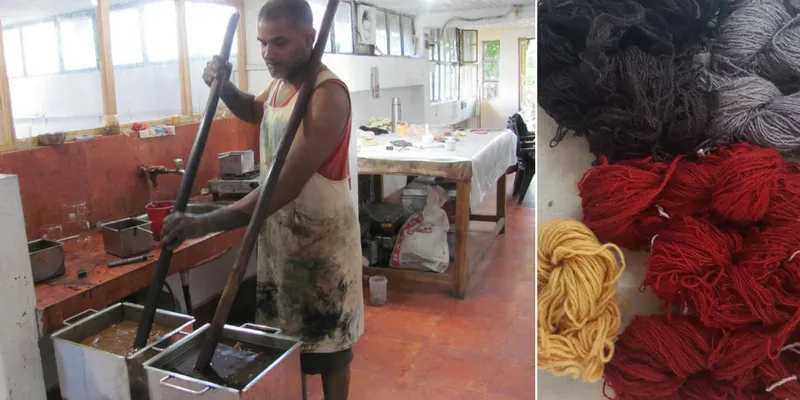About 20 years ago, Rashmi and her husband migrated from Delhi to the Kumaon region of Uttarakhand for a simpler life and serendipitously stumbled upon the Bhotiya community’s best-kept secret – the heritage art of hand spinning, hand weaving, and natural dyeing. What happened next was the genesis of Avani, a sustainable enterprise that would empower a traditionally skilled mountain community.
In the last two decades, Avani’s remarkable enthusiasm for preserving and reviving traditional craft and sustainable development of the region, its people, and their art, won them the prestigious UNESCO Seal of Excellence and a spotlight at the Ethical Fashion Forum, in London.

From intricate weaves to vibrant colors, each Avani creation narrates the rich tapestry of the mountain community they represent. Over the years Avani has employed and empowered more than 1100 artisans from 50 villages until 2015, and the numbers have only soared. Many of Avani’s Earthcraft weaves and pigments have made their way to the fashion industry in India and overseas, crafting a perfectly synced closed-loop that further uplifts the craftsmen and locals of Kumaon.

“The product is fair-trade, zero waste and it follows ecological processes of production, which begins with rainwater harvesting and ends with wastewater recycling. At every stage we make sure there’s a loop so we are not adversely impacting the soil or water.” asserts Rashmi Bharti, Co-founder of Avani and Chairman of Kumaon Earthcraft Co-operative.
All natural and native
Kumaon Earthcraft Cooperative began in the year 2005, as an initiative by its parent NGO, Avani. Nestled in the central Himalayan ranges of Uttarakhand, the cooperative focuses on developing rural livelihood opportunities through the revival of traditional crafts of handloom, to bring positive qualitative change in rural mountain communities.

The cooperative has small-scale operations, spread over seven centers across different, often very remote, villages in the Kumaon region of Uttarakhand. Built on the ethos of environmentally sustainable development, Earthcraft works only with natural fibers and yarns, like eri silk, tassar silk, muga silk, linen, harsil wool, and 100% merino wool.

From yarn spinning, weaving, and dyeing using locally cultivated plants, to creating the end product, Earthcraft has a full production line spread over its many village centers. Today Earthcraft is a strong network of artisans and farmers who work together to grow, process, design, and create products that generate income in rural Kumaon.
The textiles produced by Earthcraft have been awarded the UNESCO Seal of Excellence and showcased as a Sustainable fashion brand at the Ethical Fashion Forum, in London. Over the years, they have won many awards for their work towards craft revival and slow, ethical fashion approach.
Rashmi & Kumaon
Originally from Delhi, Rashmi Bharti and her husband moved to the Kumaon region over 20 years ago seeking a simpler, less materialistic way of life. They were enamored with the natural beauty of the region and wanted to contribute to improving the quality of life of the rural communities.

Most of the villages at that time were either unelectrified or had very erratic power supply. They began their work by disseminating solar lighting systems in remote villages that would provide reliable lighting to villagers. However, they soon realized that the poorest of the poor were not participating in this program, as they did not have the financial means to contribute a nominal amount of Rs 30 (or about 50 cents) per month to purchase the lights. Rashmi knew that increasing their income was necessary to enable the rural poor to access eco-friendly technologies
During this time, Rashmi worked with a village of traditional artisans from the Shauka community who made shawls, blankets, and carpets with Tibetan sheep wool and practiced the traditional arts of hand spinning, hand weaving, and natural dyeing. Seeing the incredible skills the communities possessed in these arts, Rashmi had the idea to create a sustainable enterprise that employed local people, particularly women, to foster economic activity and give people viable, dignified livelihood opportunities that were environmentally friendly and rooted in ancient crafts and traditions. Hence, Avani was born.
In a few years, an initiative that employed just 20 families grew to over 500 families by 2005, when Avani launched the Kumaon Earthcraft Self-Reliant cooperative to promote community-based management of its production.
Heartily hyperlocal
In 2010, Rashmi decided to experiment with cultivating indigo plants on wastelands, to enable Earthcraft to utilize its indigo dyes rather than purchasing through external producers, while also regenerating mountain wastelands.
With the success of this initiative, Earthcraft is now working with over 250 farmers to grow high-quality, sustainable indigo. In addition, Earthcraft has continued experimenting with other natural dyes and has identified over 50 indigenous plant species that produce color.

Earthcraft has also created products like organic crayons, watercolors, and wood stains, to expand Earthcraft’s ‘eco-friendly’ approach beyond apparel and into home goods. Throughout this rapid expansion, Rashmi has retained her focus on using local people, local resources, and local skills to create environmentally friendly livelihood opportunities in this region she calls home. Employed, empowered & enabled – the manifesto of Avani.
Earthcraft’s parent NGO Avani believes in involving members in each step of their sustainable production, trains its employees in building management and other skills, and cares about the holistic welfare of the community.
“Women are the backbone of the hills. 98% of the artisans at Avani Earthcraft are women. In the last 7-8 years they have become empowered, looked after family expenses, and educated their children, and it’s been a beautiful process to watch their confidence build up.” expresses Rashmi Bharti.
Avani’s Critical Change Philosophy
As Avani’s label, Earthcraft’s work is centered in highly remote villages, most of which are inaccessible via road, where livelihood opportunities are scarce. 18 years ago, Avani started reviving the traditional skill of hand spinning, hand weaving, and natural dyeing to produce contemporary products that are high quality, innovative, beautiful, and ethical.
Although numerous nonprofit organizations are working across the ethical textiles/natural dyes production process, Earthcraft distinguishes itself through its holistic, “closed-loop” approach. Rather than simply focusing on producing natural indigo dye, or weaving natural textiles, Earthcraft involves community members in each step of the production process, from seed to scarf. In this way, the resulting supply chain is fully sustainable, ethical, transparent, and beneficial to each producer.
Avani’s emphasis on conservation and judicious use of natural resources has led to the reclamation of wastelands and the regeneration of forests.
In addition to employing individuals throughout the supply chain, Avani also operates a school for local village children, provides self-help and microcredit groups for women, trains its employees in management, leadership, and accounting, among other skills, and uses fully sustainable production processes, including recycled water and clean energy. In this way, Avani addresses the economic issues in the Kumaon region and the environmental and social challenges. Perhaps most importantly, the production process is rooted in community: by involving community members throughout Earthcraft’s growth and expansion, Avani has created a uniquely participatory model of dye production that reasserts the value of traditional skills and culture, sustains rural livelihoods, and provides a choice for local communities to continue to stay in their ancestral homes while comfortably supporting themselves and their families.











